
White on black. This is a black and white film, a bold choice as always.
Abel Ferrara directs a film that is off the beaten path as most of his films are. Starring Lili Taylor, Anabella Sciorra, Edie Falco and a stunning appearance by Christoper Walken.
Kathleen Conklin (Lili Taylor) is accosted on the street and dragged into an alcove by a woman calling herself Casanova (Annabella Sciorra). She tells Kathleen to "Look at me and tell me to go away". Absolutely terrified Kathleen can only muster a cry to do no harm. Casanova looks at her like a piece of meat and goes for the jugular as any vampire would do.
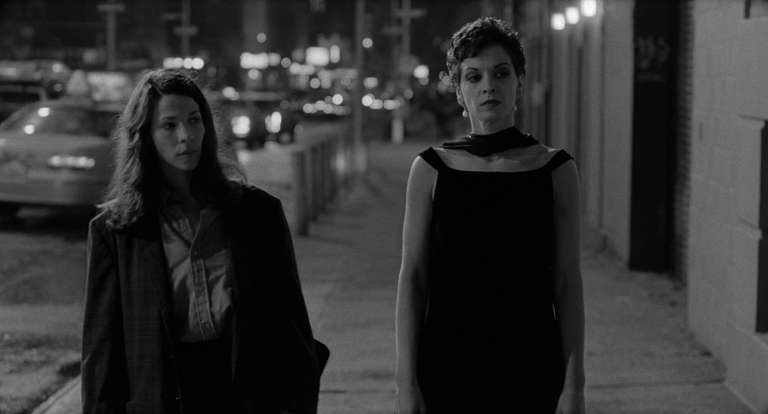
A random encounter on the streets of New York City. There is something captivating about Annabella Sciorra on the right.
She stands out like you wouldn't believe. Meanwhile, Lili Taylor is unaware of the events to come.
Our journey begins into the transformation of a vampire in New York City. We discover Kathleen is a graduate student working on her doctorate in Philosophy. This will come in handy throughout her journey I'm sure.
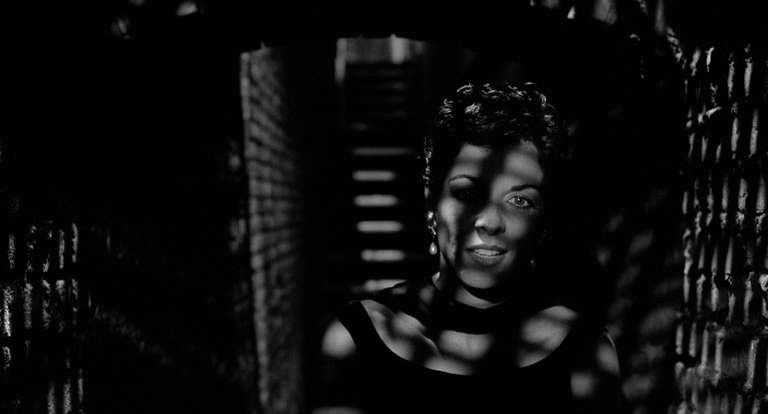
Christopher Walken was supposed to play the role of Casanova as written in the script. The gender swap only added to the intrigue in the end. I love how this turned out.
We start to see her demeanor change rapidly along with her now dead or more specifically undead body. Mirrors and sunlight become her nemesis. She covers the mirrors in her apartment and we often see her wearing dark sunglasses while never venturing out into any form of light.

Lunch doesn't seem so appetizing once you've been changed into a vampire. You only seek out one type of food as we all know. Edie Falco is busy as always with her schoolwork.
She's not the only Sopranos alumni found in this film.
Her friend Jean (Edie Falco) starts to notice Kathleen's swift and rapid change in demeanor and is worried about her well being. They are both working towards their own PhD and is a confidant of hers. She doesn't understand what's happening here.
Throughout Kathleen's transformation we see her meeting different people through school and on the streets of New York. Each victim is turned into a vampire like her as she's not actually draining them completely and thus creating another like herself.

The transformation comes on quickly. The meek woman she once was is no longer there. She takes what she wants when she wants. The change in demeanor is obvious and scary at the same time.
Throughout her bloodlust travels she becomes more emboldened and her personality changes to suit her new found power. Her physical strength has increased and she can take down humans much larger and stronger than herself with ease. At the same time her viewpoint on the world is shifting from her initial meek demeanor to that of a predator but with an analytical mind.
One night she happens upon a man and tries to use her strength to overpower him. This man, Peina (Christopher Walken) notices who she is immediately and cannot be subdued. Instead, he invites her to his apartment and lets her in on a revelation that few of their kind know.
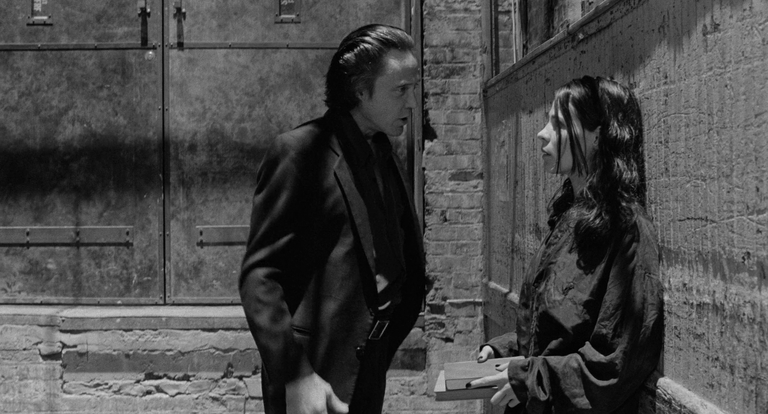
As with most Abel Ferrara films Christopher Walken makes a memorable appearance and brings so much to his role. He has lived centuries and tries to pass some of his wisdom to this newly born creature. She is not yet ready to take it and must figure her new life out on her own terms. This always seems to be the way.
Peina, has lived for a good many centuries and can almost pass as human as he explains to her. He can eat, blend in and even hold a job like any standard member of society. He has mastered the art of self control, a trait Kathleen has yet to acquire. She wants to learn his ways but at the same time is struggling immensely with her continually unsatiated bloodlust.
The film continues onwards in Kathleen's search for understanding of where she fits in this new world and the new body she now inhabits.
Shot completely in black and white, this is a cinematic choice that works well for a vampire tale. Blood appears black while this color scheme gives an otherworldly appearance. A period piece of the 1990's reinforced with hip hop tracks from Cypruss Hill and Onyx set in a still relatively grimy New York City.
Ferrera is a director with a clear vision. His work has been controversial many times in the past but always thought provoking. In this outing, The Addiction can be viewed as a metaphor for actual drug addiction. Ferrera himself was addicted to heroin for many years and it's evident this subject matter has a personal connection to him.
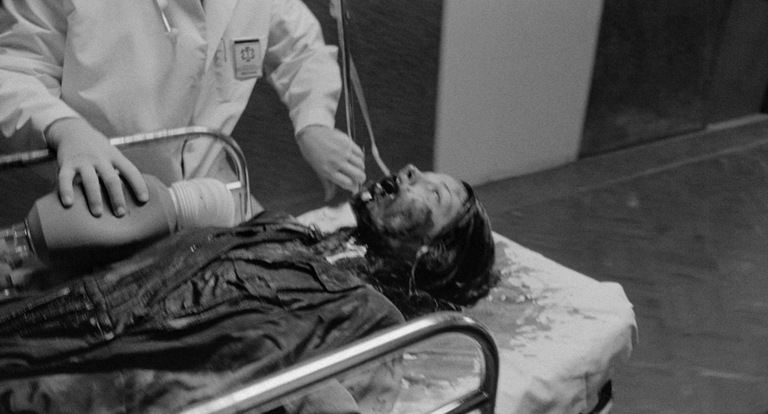
Bloodlust taken to the extreme? Abel Ferrara is never shy to tackle the larger ideas and has paid the price during his career for telling the stories the way he wants. There is no surprise that actors will jump at the chance to work with him.
The notion of vampirism is very similar to drug addiction. A continual need to have the fix satisfied. The main difference some might argue is that drug addiction can be cured, vampirism contains no such respite. This is why Walken's character is so fascinating. He has found his own way of dealing with his addiction and reconciling it with his own viewpoint of the self. As mentioned, he tries to pass this on but it's much easier to teach rather than put into practice as our student Kathleen discovers.
The philosophical overtones are what caught my attention. Sartre, Nietzsche, Heidegger and many other influential thinkers were referenced and even quoted throughout the film. There is a reference to Naked Lunch by William S. Burroughs thrown in there for good measure surrounding the nature of addiction itself.
While there is a heavy philosophical slant during a good portion of the film its usage is mandatory. The journey through addiction is a tough one that with a great deal of self-reflection either at the time or once said addiction has been conquered.
Christopher Walken as usual adds a sense of wisdom and understanding of living that few actors could bring to the role. He attempts to teach this young woman about true addiction and the high you get from not letting your desire take root. He actually references Naked Lunch at this point.
References to the My Lai Massacre and the Holocaust were a bold and interesting choice. Attempting to relate these atrocities back the main character and their journey can be taken either way. Too much or right on point? Ferrara leaves the viewer to make that choice. Let's not forget that vampires were on the rise at this time as Interview with the Vampire (1994) was released a year earlier and the world was enthralled with the romantic ideals often associated with this film. Abel Ferrara's take on the genre flipped it upside down while adding copious amounts of self-reflection unseen before in a modern tale of this type.
Arthouse filmmaking comes to mind with this entire affair. You'll need to be in the mood to digest this film entirely. Once you do I think you'll come out the other side with a better understanding about life, addiction and even redemption.
The last line of film tells us all we need to know "self-revelation is annihilation of self".
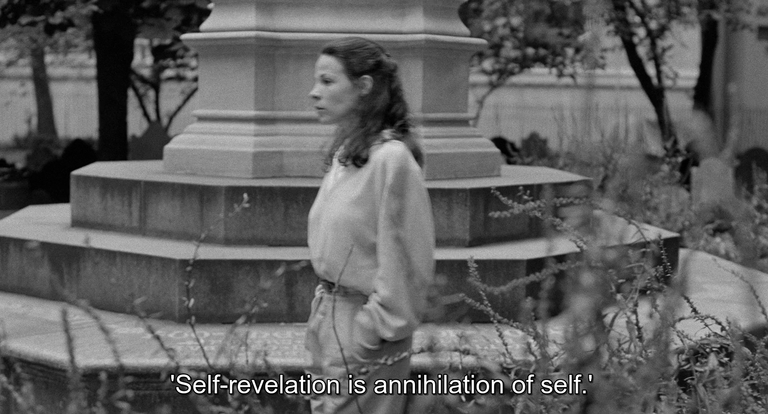
A little last tidbit before the credits roll. This leaves you thinking in the best way possible. The standard vampire tale this is not and that's for the best.
A wonderful film that reaches deep into the soul and questions who and what we are. This is what I would call an experience film. While the visuals are not the trip you take you do take a trip in a philosophical and spiritual sense. Who we are, what we are and how we deal with existence are the most interesting aspects to me, especially in vampiric form.
Thanks for the read 🙂
All media captured by myself from the original source.




